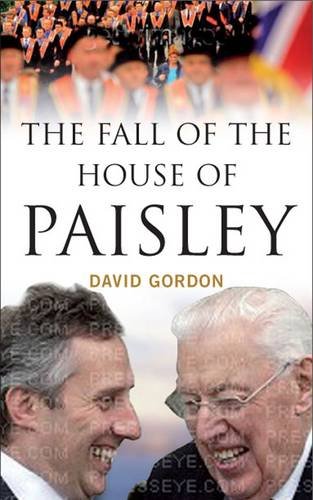'Fall of the House of Paisley' updated.
 It might be premature to talk about 'the fall of the house of Robinson', but David Gordon has updated his excellent book on the Paisleys to account for recent events. As the Political Editor for the Belfast Telegraph it's impressive that he managed to find the time! The original review if here.
It might be premature to talk about 'the fall of the house of Robinson', but David Gordon has updated his excellent book on the Paisleys to account for recent events. As the Political Editor for the Belfast Telegraph it's impressive that he managed to find the time! The original review if here. The Iris Robinson sex-and-money scandal forms part of the crumbling of the Paisleyite movement
in Northern Ireland politics’, a new version of an acclaimed book argues.
First published in autumn 2009,The Fall of the House of Paisley, by Belfast journalist David Gordon, charted how Ian Paisley's time as Northern Ireland's First Minister came to an abrupt end in 2008. The new version, published this week, has been updated to examine the impact of the scandal surrounding Iris Robinson which broke early in the new year.
Gordon's book received highly positive reviews and repeatedly made the non-fiction best-seller lists during the Christmas period. The book begins on the historic day in 2007 when the DUP and Sinn Féin stood together and announced they had done a deal to restore devolution in Northern Ireland. This immediately damaged Paisley in his heartland. From there Gordon charts the developments which ripped apart the House of Paisley. The DUP soon lost a council by-election in Dromore, Co Down that it had been expected to win quite comfortably. Then there’s Ian Paisley junior’s resignation which highlighted faults in the Stormont system relating to accountability, public standards, nepotism and use of tax payers’ money. The way this controversy also brought down his father has echoes of a biblical or Shakespearian drama, and it makes for a riveting read.
The Iris Robinson scandal involved an affair with a teenager around the same time she was crusading against homosexuality. She also used £50,000 from property developers to help fund her young lover's business. Sex-and-money scandals are bad news for any political party. But, as the book points out, this was the DUP, with its roots deeply embedded in a stern, censorious brand of evangelical Protestantism. The Robinsons were very much part of the Paisleyite world, where dogmatic religion and politics were mixed. When Iris Robinson launched her salvos against homosexuality she might have caused some embarrassment to her more media-savvy DUP colleagues. She was in fact staying true to the traditions of her party.
As Gordon shows, when Iris Robinson first entered political life in 1989, the DUP manifesto carried a message from leader Paisley under the heading ‘For God and Ulster’. It also stressed the party’s opposition to ‘immoral practices’. Iris Robinson also clearly believed she had divine approval for her entire political career.
Paisley's DUP traditionally had two central themes - blending politics with religion and accusing mainstream unionist politicians of betrayal. Now the party is the mainstream itself, and is Sinn Féin's principal partner in power. The Iris Robinson scandal is likely to help deter DUP politicians from preaching about other people's private lives in future. It seems that traditional Paisleyism is on the way out, along with its founder.
‘Gordon’s account is as sharp as a blade, cutting deep into the murky world of Stormont’, The Sunday Business Post.
‘A fine piece of investigative journalism’, The Irish Independent.
Comments